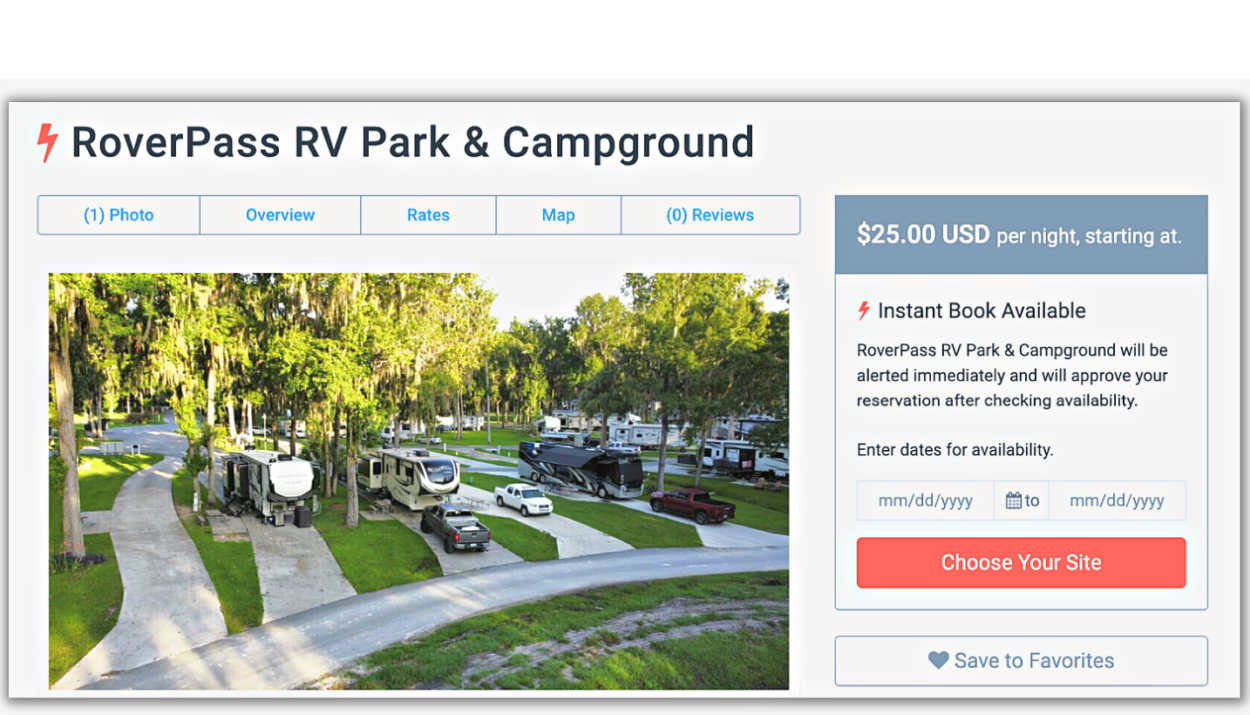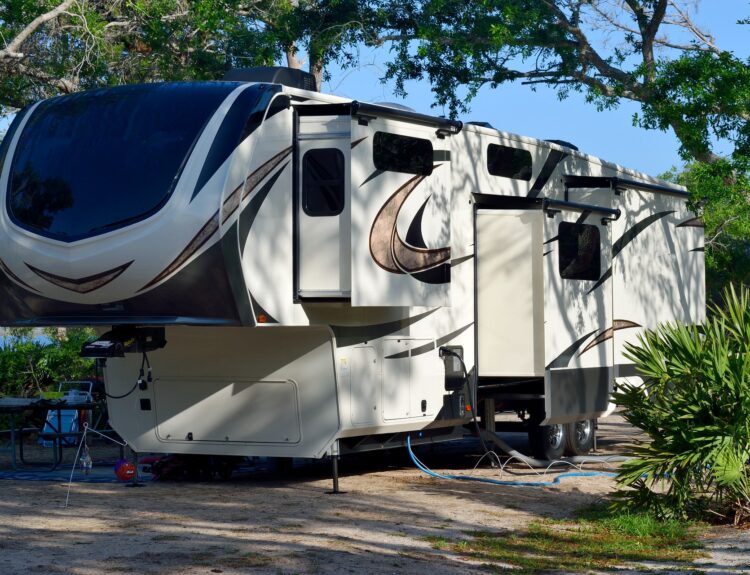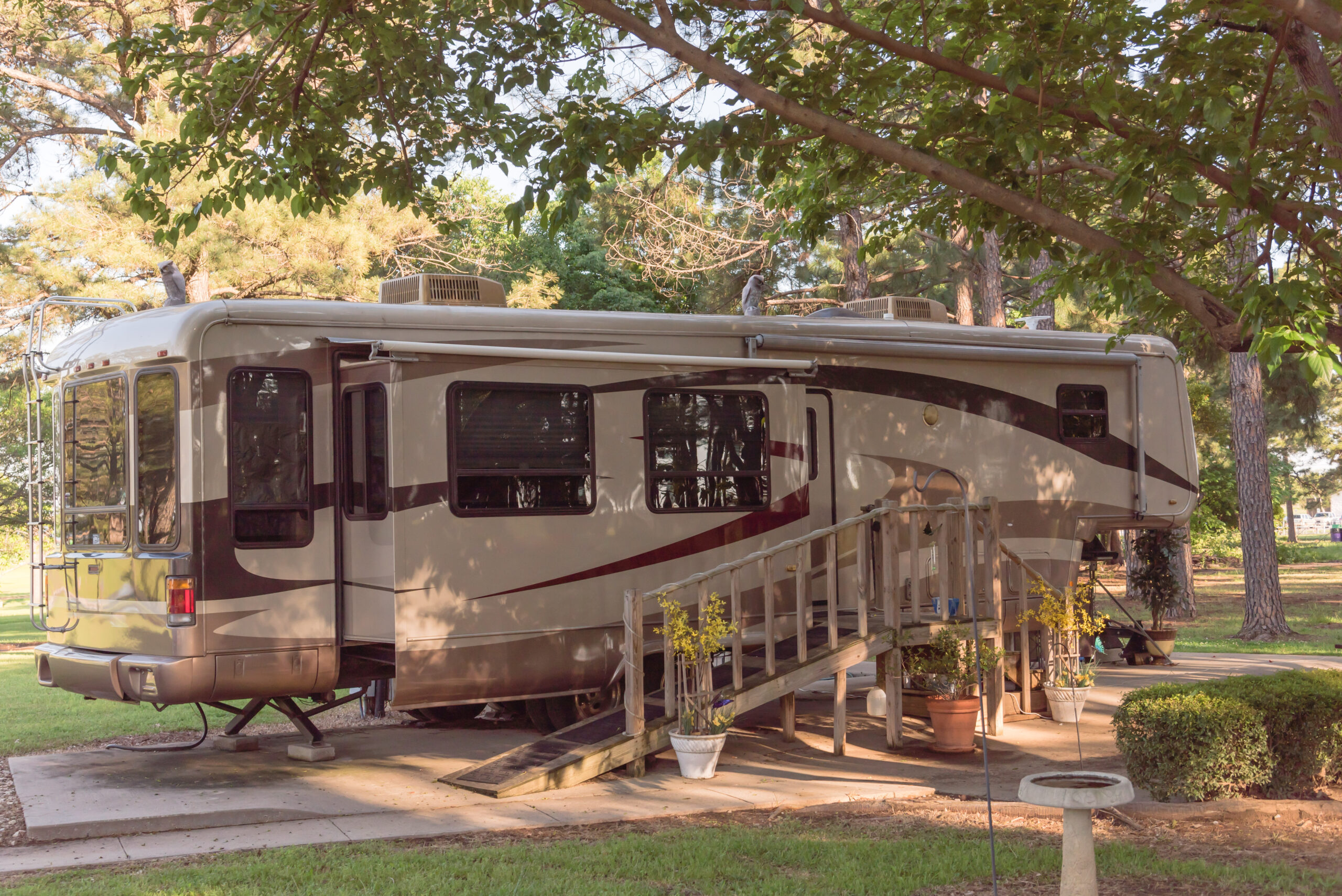The most promising step any campground/RV park owner can take for their business boils down to simplifying the buying process. You can have all of the fanciest software and the most outstanding team, but without an informative and captivating campground listing, how will any of your visitors know what truly makes you stand apart from the crowd? Taking the time to create an engaging listing not only provides visitors with clear expectations but also clears space for you to do what you do best—grow and expand your business.
Where the conveniences of modern technology serve as resourceful tools in growing and maintaining any campground/RV park, there are a few prerequisites worth considering when appealing to current and potential visitors. RoverPass has the largest directory of RV Park and campground listings on the market and in our experience, working with owners across the nation, we know a thing or two about executing stand-out techniques to let your campground/RV park speak for itself. In adding these details to your listings, you are directly telling visitors their experience is at the top of your priorities.
8 Surefire Ways to Make Your Campground Listing Stand Out
From a camper’s perspective, having as much information about a site can be the difference in making or breaking an entire adventure. When a listing is sure to cover specifics like RV hookups, tent tables, and basic amenities, guests can better plan for their experience without over or under preparing. On the other hand, refusing to showcase the minute details of your property can leave potential visitors in a guessing game of uncertainty.
Surprises like not knowing whether a space has showers or basic general store items are the last thing any camper wants to deal with when traveling. Your listing is the go-to space for addressing these helpful details and making the choice to book so much easier.
1. Paint a picture with several great campground/RV park photos
If a picture tells a thousand words, a descriptive and well-written listing is only half the story. Oftentimes, this is the first detail a camper will notice before exploring a listing further. Visitors want to know what the grounds will look like before they get there and determine the ambiance of how their stay will unfold. Campground photos should highlight the natural landscape, capture appealing amenities, show off the campground culture, and entice potential visitors with a rejuvenating and fun time.
Be sure to include a few standard images of a general campsite set up. This may seem like a small task, but it goes a long way in ensuring campers know exactly what they are booking. A good rule of thumb is to have 10 pictures, minimum. Every photo should serve a purpose in adding to the visual story of what your park is all about.
2. Tell your story with a detailed and engaging campground/RV park description.
Once you have gathered a selection of photos that successfully convey what a stay at your campground/RV park will be like, go the extra mile by adding detailed descriptions that expand the camper’s imagination. Perhaps you have several waterfront campsites that double as a launch for kayaks and canoes. Mention it! Maybe you have a general store that is open 24-hours. Include these details alongside your photos. Don’t underestimate the simple details either. Make sure you include a description of the park’s location (city/state), proximity to surrounding towns, attractions, and other nearby natural wonders.
What are the details you want everyone to know and what makes your campground a must-visit location? Essentially, you want to create a pre-booking experience that immerses potential visitors in a conversation with all things related to your park.
3. Be sure your campground/RV park rules are clear as to minimize error based on miscommunication. Transparency is key.
Rules and limitations are essential to maintaining visitor safety while simultaneously ensuring the longevity of your property. Campers need to know what is expected from them and what kinds of behaviors will not be tolerated. Is there a pack-in/take-out garbage policy? Are there quiet hours visitors should be aware of? These details create a successful pathway that removes unnecessary confusion. Making these expectations clear, from the start, aids in cultivating a smooth experience for all while boosting ratings and nurturing a string of satisfied campers.
4. Be clear about your cancellation policy.
Again, your campground/RV park listing should do as much of the heavy lifting in addressing inquiries and concerns—before they become an issue. If your listing does anything, let it be the safety net in preventing disputes, stress, and loss of revenue. Consider whether cancellations are to be refunded or not and if there is a specific date on when cancellations can be made.
Every owner will have their preferences on how strict or flexible to be with their cancellations. As a leading campground management software provider, we find it’s in an owner’s best interest to enforce a strict policy. This keeps camper expectations clear while limiting any customer service mishaps on you and your team.
5. Let your campers know the check-in/check-out procedure.
Your next camp group has booked and secured their space. What comes next? Be sure to communicate the check-in/check-out procedure. Can campers arrive at any time or during operating hours? Are check-out times set or are they flexible? Again, this is critical information that helps campers plan ahead while ensuring your energy, as a park owner, can be directed on more growth-oriented tasks.
6. Showcase your campground/RV park amenities and features.
Campground amenities and features are a plus and are not necessarily required in making a dream experience. However, if you have specific qualities like showers, fire pits, and picnic tables, for example, it only serves your business to include these details in your listing. Since every camper has different needs, providing a description of features they can look forward to—either on-site or nearby—can offer visitors an array of accommodations on how to best enjoy their stay. What does your campground offer that future visitors need to be aware of?
7. Advertise your offerings, rentals, and items for sale.
Let campers in on resourceful extras from general store hours to watersport rentals in your photos and descriptions. This can go a long way by letting campers in on what necessities to pack and what they can leave behind, saving space in their vehicle for other must-haves. Aside from the preparatory assistance this lends to campers, it can also soothe concerns in the event they run out of their favorite snack or forget to pack an extra fishing pole.
8. Post a full sitemap to give visitors a peek at the property with an opportunity to book their favorite spot.
Providing guests with a full sitemap of your property is a critical component of making a listing that attracts visitors. Campers like to see how a park is spaced out and where the most attractive spots are when booking their stay. Showing them where RV sites are located, and whether sites are pull-through or back-in accessible is a great help when planning how to set up for camp.
Since campground spots can often fill up quickly, RoverPass provides interactive campground maps that let visitors reserve their site while booking. From a campers’ perspective, having the opportunity to select the most enticing space adds a level of customer certainty to the overall experience. If your listing does anything, may it be in instilling confidence that continues well beyond the initial planning steps and spill into their next visit!
An Immaculate Listing Does All the Heavy Lifting So You Can Focus on Expansion
The more detailed your listing is, the more you can focus on tending to customer experiences and investing in overall business growth. Your campground/RV park listing is, more often than not, the first thing a potential visitor sees.
The most successful listings not only attract new visitors, but they establish a loyal relationship with happy and returning campers, referrals, and outstanding reviews.
If you are looking for other ways to advertise your property or simply have sites you want campers to book, then explore the RoverPass Marketplace. With 500,000 monthly visitors, campgrounds receive on average 7 new booking requests a month. That’s new revenue right into your pocket from campers who may not have ever booked you otherwise! Best part is the listing process is easy (just follow our tips above) and joining the RoverPass Marketplace is completely free!





